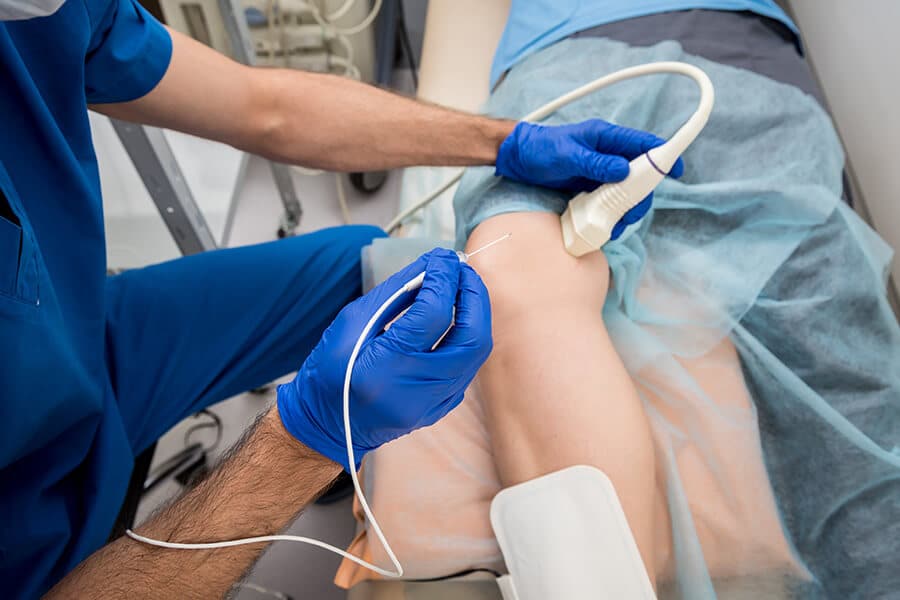What is Pelvic Vein Embolization?
Women with Pelvic Congestion Syndrome (PCS) can experience pelvic or lower abdominal pain that interferes with their ability to participate in normal daily activities, including work or a special social event. Pelvic Vein Embolization can be a way forward for women with PCS.
Pelvic Vein Embolization (PVE) is a minimally invasive, non-surgical procedure to address Pelvic Congestion Syndrome. It is usually performed in an outpatient setting and involves the use of a combination of local anesthesia and some sedation.
In PCS, the veins in the pelvis are distended and cause pressure on surrounding structures, which leads to pain. During Pelvic Vein Embolization, coils (tiny plugs) are used to seal the enlarged veins. The reduced blood flow lessens the congestion in the veins and the symptoms of PCS are relieved.
Here are a few things you need to know about PVE:

Pelvic Vein Embolization can be used to treat Pelvic Congestion Syndrome (PCS)
Pelvic Congestion Syndrome is a venous condition involving varicose veins of the pelvis or ovaries. Patients who experience PCS can experience pain or aching around the pelvis and lower abdomen, pain that increases during menstruation, or pain that worsens after standing, walking, or having sex. They may also feel a dragging sensation or pain in the pelvis, a feeling of fullness in the legs, a swollen vulva or vagina, or a worsening of stress incontinence. Sometimes they experience a combination of symptoms. One in seven women will experience PCS, and PCS is the cause of pelvic pain in 13-14% of women with the condition.
Your doctor can help you decide if you are a candidate for PVE
Treatment decisions are not always easy to make. You need good information, lots of support, and attention to your particular situation and needs. Your doctor can help you decide if PVE is a viable option for you after an evaluation of your symptoms.
Sometimes medication can be used to treat PCS, but Pelvic Vein Embolization is the most often indicated treatment for PCS. Other treatment options include surgical removal of the affected vein or hysterectomy (with or without removal of the ovaries). The patient’s symptoms and the severity of the symptoms will be taken into consideration in the treatment plan.
PVE is non-surgical
Because PVE is non-surgical, it is described as a minimally invasive procedure. PVE is performed by an interventional radiologist who inserts a thin tube (a catheter) through a vein in your groin, neck or wrist. The doctor will guide the catheter to the affected area in your pelvis so that the enlarged vein can be sealed using small metal coils. PCS causes excessive blood to flow from enlarged veins, so once the affected vein is sealed, it can relieve pressure. The coils are inserted along with a medication that promotes scar tissue formation, helping to close varicose veins in the patient’s pelvic area.
Because this procedure is minimally invasive, there is less pain and no incision as well. Most patients can return to work and full activities within a week.
Most patients experience improvement in their symptoms
The pain and discomfort of Pelvic Congestion Syndrome causes many women to avoid normal life activities. Alleviating these symptoms can help you start living your life to the full again. The good news is that Pelvic Vein Embolization can be highly effective in alleviating symptoms in most cases. More than 75% of patients experience improvement in their symptoms after undergoing treatment.
Patients are usually able to return to work within a week
Getting back to life and work as soon as possible is a top priority for patients. After a PVE, patients usually go home a few hours after treatment. They may experience some cramps, mild nausea or discomfort for a few days. Most are back to work and regular activity within a week.
Our team is dedicated to helping women with Pelvic Congestion Syndrome get all of the information they need to make their own decisions about treatment. If the Pelvic Vein Embolization is appropriate, we are ready to support you every step of way through the process.
If you are experiencing the symptoms of Pelvic Congestion Syndrome, reach out to us today to schedule an appointment.
